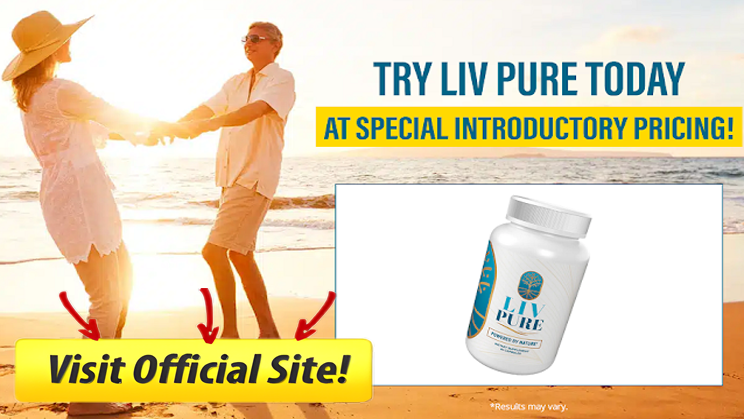Are there bulk purchase options for Liv Pure?
Yes, Liv Pure offers bulk purchase options that provide significant savings compared to buying a single bottle. These options are designed to be more economical for those who want to commit to using the supplement over an extended period. Here’s a breakdown of the bulk purchase options available:
1. Three-Bottle Package:
- Price: Around $147 for three bottles.
- Cost Per Bottle: Approximately $49 per bottle.
- Savings: This option offers a discount compared to buying three individual bottles at the regular price of $69 each. It is ideal for those looking to use the supplement for three months and save money in the process.
2. Six-Bottle Package:
- Price: Approximately $234 for six bottles.
- Cost Per Bottle: About $39 per bottle.
- Savings: This is the most cost-effective option, offering the largest discount per bottle. It’s designed for those who are committed to a longer-term regimen, as it provides a six-month supply of the supplement at a significantly reduced price.
Additional Considerations:
- Free Shipping: Depending on the promotion, these bulk purchase options may include free shipping, which adds to the overall savings.
- Risk-Free Guarantee: Both bulk purchase options are typically covered by the 60-day money-back guarantee, allowing customers to try the product without financial risk, even when buying in larger quantities.
Conclusion:
Bulk purchase options for Liv Pure provide considerable savings, especially with the six-bottle package. These options are ideal for those who plan to use the supplement over a longer period and want to maximize their savings while ensuring a consistent supply.
Is Liv Pure covered by insurance or health savings accounts?
Liv Pure, like many dietary supplements, is typically not covered by insurance or health savings accounts (HSAs). Here’s a detailed explanation of why this is generally the case:
1. Insurance Coverage:
- Prescription vs. Over-the-Counter Products: Insurance plans generally cover medications that are prescribed by a healthcare provider and approved by regulatory bodies such as the FDA for specific medical conditions. Liv Pure, as a dietary supplement, is available over-the-counter (OTC) and is not classified as a prescription medication. Because it is not prescribed for the treatment of specific, diagnosed medical conditions, it is not eligible for insurance reimbursement.
- Medical Necessity: Insurance companies typically require a product to be deemed “medically necessary” for coverage. Supplements like Liv Pure, which are often marketed for general health benefits such as liver detoxification and weight loss support, do not meet the strict criteria for medical necessity that insurance companies use to determine coverage.
2. Health Savings Accounts (HSAs) and Flexible Spending Accounts (FSAs):
- Eligible Expenses: HSAs and FSAs are tax-advantaged accounts that allow individuals to set aside money for qualified medical expenses. However, the IRS defines eligible expenses quite narrowly. For an item to be eligible, it generally needs to be used to treat or prevent a specific illness or condition. Dietary supplements like Liv Pure, unless specifically prescribed by a healthcare provider as part of a treatment plan for a diagnosed medical condition, are usually not considered eligible expenses.
- Doctor’s Prescription Exception: In some cases, if a dietary supplement is specifically prescribed by a doctor to treat a diagnosed medical condition, it may be eligible for reimbursement through an HSA or FSA. However, this is rare and usually requires documentation proving that the supplement is part of a necessary treatment plan.
3. Why Supplements Are Not Covered:
- Regulatory Classification: Dietary supplements are regulated differently than prescription drugs. In the United States, the FDA does not evaluate dietary supplements for safety and efficacy in the same way it does for medications. This distinction plays a significant role in why supplements like Liv Pure are not covered by insurance or eligible for HSA/FSA reimbursement.
- Preventive vs. Therapeutic Use: Supplements are often used for preventive health purposes rather than to treat a specific disease or condition. Insurance and tax-advantaged accounts tend to focus on covering products and services that are necessary for treating existing health issues, not for general wellness or prevention.
4. Out-of-Pocket Expenses:
- Direct Purchase: Since Liv Pure is not covered by insurance or HSA/FSA accounts, consumers need to purchase it directly out-of-pocket. This is a common situation for those using dietary supplements, and it’s important for consumers to factor this into their overall health budget.
- Alternative Options: For those looking for coverage, consulting with a healthcare provider about prescription alternatives that may offer similar benefits but are covered by insurance could be a consideration. However, this will depend on individual health needs and the recommendations of a healthcare professional.
5. Potential for Reimbursement:
- Prescription Requirement: If you believe that Liv Pure or any supplement is medically necessary, it may be worth discussing with your healthcare provider. In rare cases, if a doctor prescribes a supplement for a specific medical condition, you might be able to submit a claim to your insurance or HSA/FSA for reimbursement. However, this would require thorough documentation and is not guaranteed.
Conclusion:
Liv Pure is generally not covered by insurance or eligible for reimbursement through health savings accounts or flexible spending accounts, as it is an over-the-counter dietary supplement primarily used for general health benefits rather than the treatment of specific medical conditions. Consumers who wish to use Liv Pure will need to purchase it out-of-pocket, though discussing potential coverage options with a healthcare provider may provide alternative solutions in certain cases.
